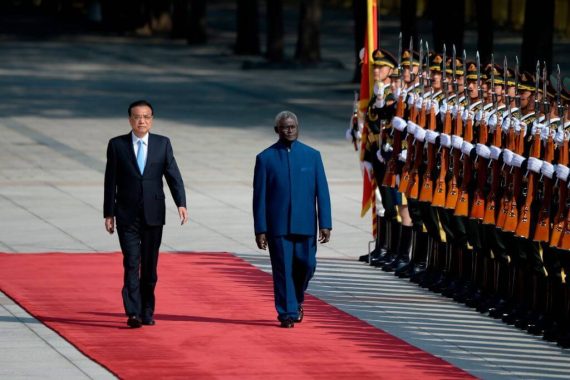To liberate Asia Pacific from Japanese Imperialist Forces during the Second World War, the United States devised an “island hopping” strategy meant to secure as many islands as possible, with the aim of forcing the enemy back to its home soil.
Two battles were crucial to the Allies’ success: the Battle of Midway in 1942, where the U.S. Navy inflicted mortal wounds on its Japanese counterpart, and the Battle of Guadalcanal spanning 1942 to 1943, where the U.S. Army and Marines defeated Japanese land forces in the Solomon Islands.
A full 80 years later, the Solomon Islands has suddenly become the centre of superpower confrontation once again, but this time between the United States and an ever-increasingly militaristic and imperialistic China.
Unlike, Japan, however, China has effectively seized the South Pacific country, comprising six major islands and hundreds of smaller islands, without firing a shot. This Chinese move has left the U.S. and Australia, along with their regional allies, in a state of frenzy rage because the islands, particularly Guadalcanal, are a choke point connecting the U.S. to Australia and New Zealand, which is why Japan wanted the islands eight decades ago, and why China wants them today.
If the U.S. is cut off from Australia and New Zealand, then it is essentially cut off from the South Pacific, giving China a huge leg up in its ambition to dislodge the U.S. from the entire Western Pacific and Asia. Suddenly, the memory of Japanese submarines torpedoing Australian vessels in Sydney Harbor, and Japanese warplanes bombing the Australian city of Darwin in 1942 has invoked a security crisis in Canberra and Washington DC.
At the centre of their collective fears is a newly signed security pact between China and Solomon Islands, which offers an opportunity for Chinese troops and warships to operate from a future Chinese military base more than 5,000 miles from its shores in the strategically important South Pacific.
It’s been called the “worst failure of Australian foreign policy in the Pacific” since the Japanese conquest of Singapore in 1942. “It’s a game changer,” Anne-Marie Brady, a professor at the University of Canterbury in Christchurch, New Zealand, told the New York Times.
During the Second World War, the Japanese used to the Solomon Islands to attack “our sea communications…[and] stop our access to international trade,” which would eventually “have led to a rapid decline of Australia’s economy, political stability and military strength,” observes Gregory Gilbert, an Australian military historian.
Today, the security pact signed between Beijing and Honiara paves the way for Chinese military presence in a country fewer than 1,500 miles from Australia’s eastern seaboard.
Australian Strategic Policy Institute executive director Peter Jennings predicts Chinese warships and warplanes could arrive in the Solomons within weeks, saying, “Their model is what they’ve done in the South China Sea, which is to move quickly and decisively before people are able to gather their thoughts and resist,” adding he expects Beijing to move while Australian policy elites are distracted with the national election, scheduled for May 21.
Solomon Island’s Prime Minister Manasseh Sogavare has given verbal assurances he will not allow China to construct a military base on its soil, but nobody in Canberra or Washington DC is buying it, given the deal was revealed only after details of it were leaked; revelations Sogavare has allowed Beijing to secretly bring dozens of weapons into Honiara; and because Beijing has essentially bought the Solomon’s parliament by paying $40,000 to parliamentarians who voted for Sogarvare.
On Friday, a U.S. delegation by Indo-Pacific envoy Kurt Campbell arrived in the Solomon Islands to discuss concerns the U.S. and its allies have over the security pact with China, which they fear will extend China’s military presence in the region, igniting a new regional arms race. Australia has also shuttled diplomats to Honiara, with Japan announcing it will do likewise later this month, and New Zealand and Tonga saying they will raise their concerns at the forthcoming Pacific Islands Forum.
Chinese state media has slammed opposition to Beijing’s security pact with Honiara, even accusing Australia of having a “colonialist mentality,” while Chinese foreign ministry spokesperson Zhao Kijian said Australia and US should “respect the sovereign and independent choices made by China and the Solomons and not instigate confrontation.”
But these claims and statements are patently absurd, given the Australian government, unlike its Chinese counterpart, has not sought to bolster its relationship with the Pacific Island country by bribing and extorting its political class.
Moreover, Australia’s Pacific “Step Up,” which has allocated $2 billion to building infrastructure in the region, does not saddle countries with unrepayable debt, unlike China’s debt trap diplomacy, or what is known as its One Belt Initiative.
“In Mr. Sogavare, the Chinese government has found a willing partner. And his commitment to such a secretive deal has shown how a single politician cosying up to Beijing in a small country can create geopolitical risks worldwide,” observes the New York Times.
Recommended
Most significantly, Solomon Islanders view the move as anti-democratic, with recent polls showing 90 percent of the country wanting closer ties to the U.S. and Australia over China, and 79 percent opposing financial aid from Beijing. They also remember that the country was rocked by anti-Chinese violence in November of last year, after it was revealed Sogavare used Chinese government money to sway votes in the parliament.
The country’s opposition leader, Hon. Mathew Wale, slammed the China deal, calling it does not represent the interests of Solomon Islanders, but “for the personal and self-interests of the Prime Minister.”
“His election campaign was said to be funded by PRC state-owned companies. The payment of members for his political survival in November was also bought with PRC money. This personal secret military deal with the PRC is no different. This deal is not for the military protection of Solomon Islands. There are no external threats to Solomon Islands. The deal is to maintain Sogavare’s hold on power and to undermine the democratic freedoms available to Solomon islanders,” he said.
The opposition leader also called out the Prime Minister over promises closer ties to China would herald a flood of Chinexe investment, which, until now, have not materialized.
While most analysts believe the Solomon Islands can be persuaded to walk back the China deal, Jennings says it will take a “focused effort” on Australia’s part and “more money than we would like to spend,” but it’s a price Canberra and its regional allies must be prepared to pay if they do not wish a repeat of the same threat they endured from an expansionist Japan eighty years ago.





